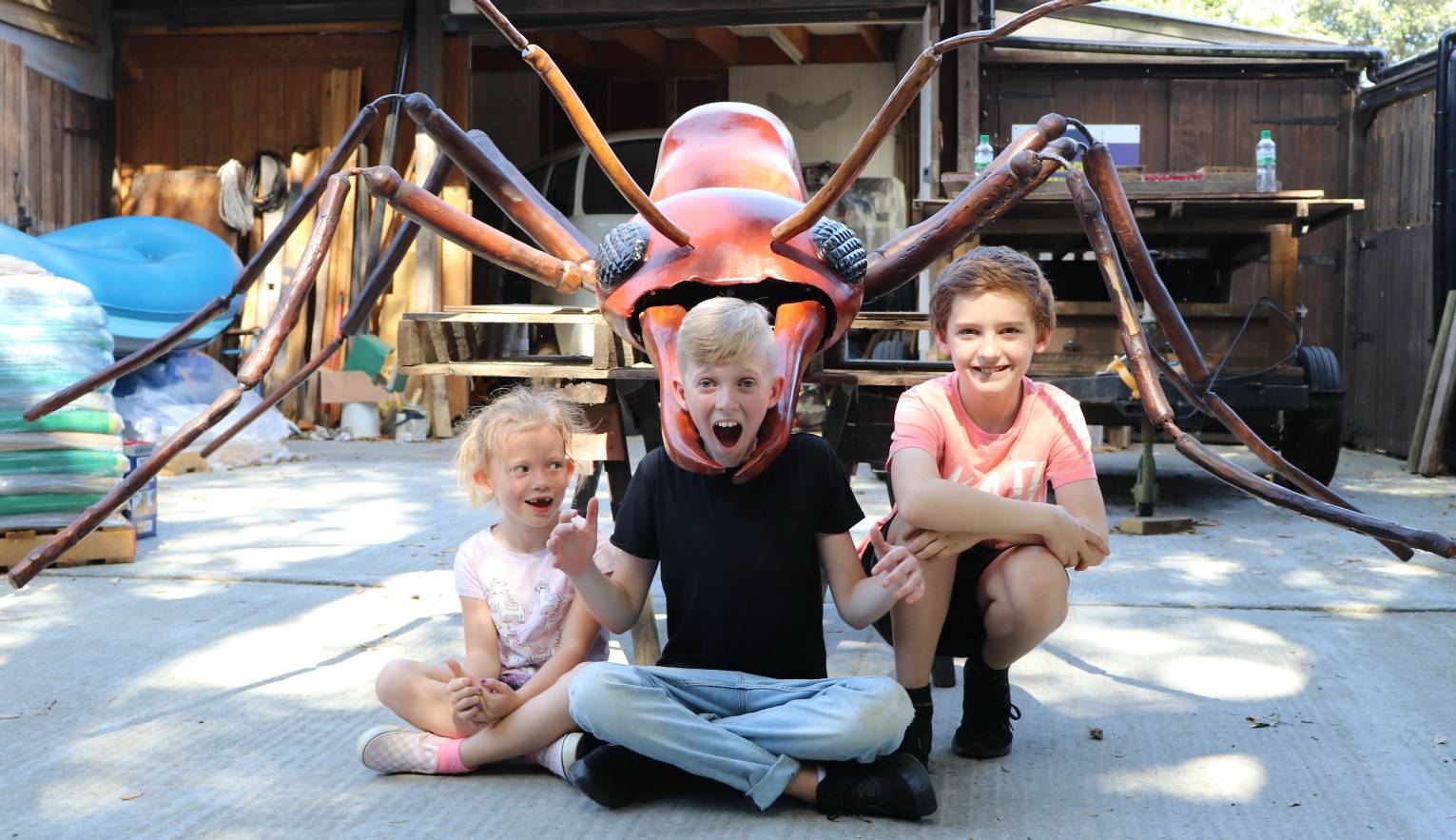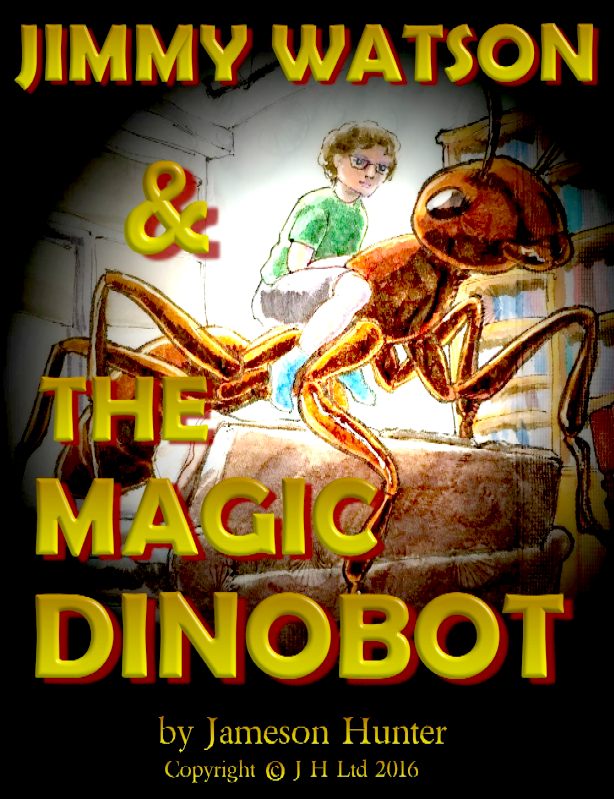|

Some
of Jimmy Watson's friends, with the Magic Dinobot
SCI-FI
MOVIE
Real Steel is a 2011 American science fiction film starring Hugh Jackman and Dakota Goyo and co-produced and directed by Shawn Levy for DreamWorks Pictures. The film is based on the short story
"Steel", written by Richard Matheson, which was originally published in the May 1956 edition of The Magazine of Fantasy & Science Fiction, and later adapted into a 1963 Twilight Zone episode. The film features a former
boxer (Jackman) whose sport is now played by
robots. He must build and train his own robot with his son. Real Steel was in development for several years before production began on June 24, 2010. Filming took place primarily in the U.S. state of Michigan. Animatronic robots were built for the film, and motion capture technology was used to depict the rodeo brawling of computer-generated robots and animatronics, respectively.
Real Steel was released by Touchstone Pictures in Australia on October 6, 2011, and in the United States and Canada on October 7, 2011, grossing nearly $300 million at the box office. It received mixed reviews on Metacritic and positive reviews on Rotten Tomatoes, which said it had a silly premise but was a good film. The film was nominated for Best Visual Effects at the 84th Academy Awards.
MOVIE
CAST
- Hugh Jackman as Charlie Kenton: A former boxer
- Dakota Goyo as Max Kenton: Charlie's son
- Evangeline Lilly as Bailey Tallet: A boxing gym owner and daughter of Charlie's former boxing coach
- Anthony Mackie as Finn: A friend of Charlie
- Olga Fonda as Farra Lemkova: Tak Mashido's partner
- Karl Yune as Tak Mashido: A robot fighting inventor and designer of Zeus
- Kevin Durand as Ricky: A negotiator and enemy of Charlie.
- Hope Davis as Debra: Max's aunt
- James Rebhorn as Marvin: Debra's husband and Max's uncle
- Gregory Sims as Bill Panner
MOVIE PLOT
In 2020, human boxers are replaced by robots. Former boxer Charlie Kenton owns the robot Ambush, until it is destroyed in a fight against a bull belonging to promoter and carnival owner, Ricky. Having bet money he didn't have with Ricky that Ambush would win, Charlie absconds before Ricky can collect.
After the fight, Charlie learns that his ex-girlfriend died and he must attend a hearing deciding the future of their son, Max, a robot-boxing fan with nearly no contact with Charlie since his birth. Max's maternal aunt Debra and her wealthy husband Marvin want full custody. Charlie bargains to cede custody of Max for $100,000, half in advance, and Marvin negotiates that Charlie retain custody of Max for three months while Marvin and Debra go on vacation. Settling into a gym owned by Bailey Tallet, the daughter of Charlie's former boxing coach, Charlie uses the half in advance money to acquire the once-famous World Robot Boxing robot Noisy Boy. He and Max take Noisy Boy to Crash Palace, an underworld boxing arena run by his friend Finn, where Noisy Boy is destroyed against another robot boxer, Midas. While scavenging for replacements in a junkyard, Max discovers Atom, an obsolete, dilapidated but mostly intact sparring robot designed to withstand severe damage, with a rare "shadow function" to mirror and memorize handler or opponent movements.
At Max's behest, Charlie pits Atom against another robot Metro and is surprisingly victorious. Max integrates Noisy Boy's voice command hardware with Atom and convinces Charlie to assist in streamlining Atom's movements. This results in a series of victories, culminating in Charlie being offered a World Robot Boxing fight with Atom against national champion robot Twin Cities. The fight starts with Atom on the attack, but Twin Cities easily takes the offensive. Charlie notices a hitch whenever Twin Cities throws a right punch, and he exploits this to win by knockout. Elated by their success, Max challenges undefeated global champion robot Zeus, with the audience squarely on their side. After the fight, Ricky and two henchmen attack Charlie for bailing earlier and rob him and Max of their winnings, prompting a defeated and dejected Charlie to return Max to Debra.
This upsets Max, and when Charlie tries to convince Max that it's better to live without him, Max reveals that all he wanted was for Charlie to fight for him and be there as a father. After Max leaves, Charlie returns to Tallet's Gym and talks with Bailey about the events, where the two kiss, revealing their attraction to each other. Persuaded by Bailey, Charlie reconciles with Max and convinces Debra to allow Max to witness the fight with Zeus that Charlie has arranged.
Later on, when the fight begins, Zeus knocks Atom down with its first punch and dominates the first round, but Atom manages to survive the first round, stunning the audience. Ricky, who bet $100,000 with Finn on Atom losing within the first round, tries to leave but is cornered by Finn and his fight bookmakers. As the fight continues, Atom lands multiple punches and withstands further attacks but makes no definitive progress. Late in the fourth round, Atom's voice-response controls are damaged, forcing Charlie to fight Zeus with Atom's shadow function. In the fifth and final round, Atom wards off Zeus long enough to deplete its power core, at which point Charlie directs Atom to begin its counterattack against a tired and helpless Zeus. With Zeus's programmers unable to compensate, the designer, Tak Mashido, intervenes and controls Zeus manually. Atom gives Zeus a sound beating, who barely avoids losing by knockout. Zeus wins by decision and remains undefeated, but Mashido's group are left humiliated by the near-loss and Zeus being critically damaged. Despite the match result, Atom is triumphantly labeled the "People's Champion" by the cheering crowd as Max and Charlie celebrate.
MOVIE PRODUCTION
Based on Richard Matheson's 1956 short story "Steel", the original screenplay was written by Dan Gilroy and was purchased by DreamWorks for $850,000 in 2003 or 2005 (sources differ). The project was one of 17 that DreamWorks took from Paramount Pictures when they split in 2008. Director Peter Berg expressed interest in the project in mid-2009 but went no further. Levy was attached to the project in September 2009, and Jackman was cast in the starring role in November for a $9 million fee. In the same month, Steven Spielberg and Stacey Snider at DreamWorks greenlit the project. Les Bohem and Jeremy Leven had worked on Gilroy's screenplay, but in 2009 John Gatins was working on a new draft. When Levy joined the project, he worked with Gatins to revise the screenplay, spending a total of six weeks fine-tuning the script. Advertising company FIVE33 did a two-hundred page "bible" about robot boxing. Levy said he was invited by
Spielberg and Snider while finishing Date Night, and while the director initially considered Real Steel to have "a crazy premise," he accepted after reading the script and feeling it could be "a really humanistic sports drama."
Real Steel had a production budget of $110 million. Levy chose to set the film in state fairs and other "old-fashioned" Americana settings that would exude nostalgia and create a warm tone for the film's father-son story. There was also an attempt for the scenery to blend in new and old technology. Filming began in June 2010, and ended by October 15, 2010. Locations include areas around Detroit, Michigan, and across the state, including at the Renaissance Center, the Cobo Arena, the Detroit Fire Department headquarters, the Russell Industrial Center, the Ingham County Courthouse in Mason, Michigan, the Leslie Michigan Railroad Depot, the former Belle Isle Zoo, and the Highland Park
Ford Plant.
Jason Matthews of Legacy Effects, successor to Stan Winston Studios, was hired to turn production designer Tom Meyer's robot designs into practical animatronic props. He said, "We have 26-and-a-half total live-action robots that were made for this film. They all have hydraulic neck controls. Atom has RC
[radio-controlled] hands as well." According to Jackman, executive producer Spielberg "actually said to Shawn, 'You should really have real elements where you can.' ... Basically if they're not walking or fighting, that's a real robot." Levy added that
Steven Spielberg gave the example of Jurassic
Park, where Winston's animatronic dinosaurs "got a better performance from the actors, as they were seeing something real, and gave the visual effects team an idea of what it would look like." As Real Steel was not based on a toy, Meyer said that "there was no guideline" for the robots, and each was designed from scratch, with an attempt to put "different personality and aesthetics," according to Levy. In Atom's case, it tried to have a more humanizing design to be an "everyman" who could attract the audience's sympathy and serve as a proxy to the viewer, with a fencing mask that Meyer explained served to show "his identity was a bit hidden, so you have to work harder to get to see
him." Executive producer Robert Zemeckis (Back
to the Future) added that the mask "became a screen so we can project what we want on Atom's face." Damage was added to the robots' decoration to show how they were machines worn out by intense battles.
For scenes when computer-generated robots brawl, "simulcam" motion capture technology, developed for the film Avatar, was used. As Levy described the process, "You're not only capturing the fighting of live
human fighters, but you're able to take that and see it converted to [CGI] robots on a screen instantaneously. Simulcam puts the robots in the ring in real time, so you are operating your shots to the fight, whereas even three, four years ago, you used to operate to empty frames, just guessing at what stuff was going to look like." Boxing hall-of-famer, Sugar Ray Leonard, was an adviser for these scenes and gave Jackman boxing lessons so his moves would be more natural.
MOVIE RECEPTION
Real Steel earned $85.5 million in North America, and $213.8 million in other territories, for a worldwide total of $299.3 million. It had a worldwide opening of $49.4 million. In North America, it topped the box office with $8.5 million on its opening day and $27.3 million in total on its opening weekend, claiming the number one spot, ahead of the other new nationwide release (The Ides of March) and all holdovers. It managed first-place debuts in 11 countries including Hugh Jackman's native Australia ($4.2 million).
On Rotten Tomatoes, the film has an approval rating of 60% based on reviews from 233 critics and an average rating of 5.91/10. The website's consensus is, "Silly premise notwithstanding, this is a well-made Hollywood movie: Thrilling and exciting action with just enough characterization." On Metacritic, the film has a weighted average score of 56 out of 100, based on reviews from 34 critics, indicating "mixed or average reviews". Audiences surveyed by CinemaScore during the opening weekend gave the film a grade A, on a scale from A+ to F.
Roger Ebert of the Chicago Sun-Times rated the film 3 stars out of 4, saying, "Real Steel is a real movie. It has characters, it matters who they are, it makes sense of its action, it has a compelling plot. Sometimes you go into a movie with low expectations and are pleasantly
surprised." Lisa Schwarzbaum of Entertainment Weekly gave the film an A−, saying director Levy "makes good use of his specialized skill in blending people and computer-made imaginary things into one lively, emotionally satisfying story".
Claudia Puig of USA Today said, "Though the premise of fighting robots does seem a plausible and intriguing extension of the contemporary WWE world, Real Steel is hampered by leaden, clichéd moments in which a stubborn boy teaches his childish father a valuable lesson." James White of the UK magazine Empire gave the film 3 of 5 stars, saying, "Rocky with robots? It's not quite in Balboa's weight class, but Real Steel at least has some heft. There's barely a story beat among the beat-downs that you won't expect, and sometimes the saccharine gets in the way of the spectacle, but on the whole this is enjoyable family entertainment."

THE MAGIC DINOBOT
- From Jameson Hunter, an
original short story with potential for adaptation as a TV series idea, germinated in 2016.
While attending a school
in Hailsham, Jimmy dreams of building a giant
robot ant as a special project, then one day his dreams come true when the robot he
has built is transformed into a living, breathing, companion. NOTE:
This story is Copyright © Jameson Hunter
Ltd, March 30 2016. All rights
reserved. You will need permission from the author to reproduce the book
cover on the right or any part of the story published on this page. JIMMY
WATSON
-
His mother, Marion, teases her son about his dreams to build a large robot ant with a
drawing of her son riding on the ant's back. Then it comes true.


CHAPTERS
- CHARACTERS
- FILMS
- MAGIC
- PLOT
OUTLINE - SECTASAUR


|





